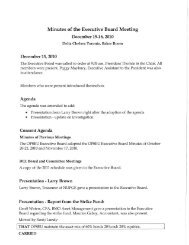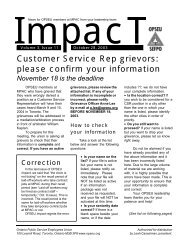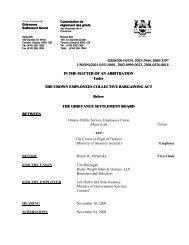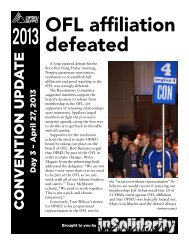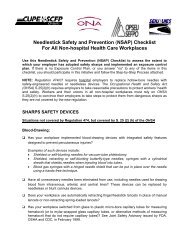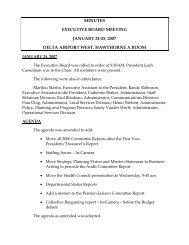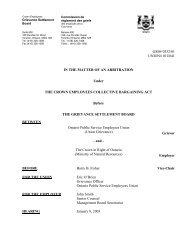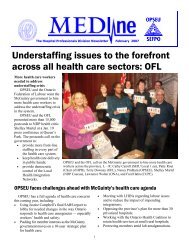IN SOLIDARITY - OPSEU
IN SOLIDARITY - OPSEU
IN SOLIDARITY - OPSEU
Create successful ePaper yourself
Turn your PDF publications into a flip-book with our unique Google optimized e-Paper software.
New Ways to Welcome<br />
New Workers<br />
R emember your first day on the job? OK, if<br />
you can’t remember back that far, then imagine it.<br />
All those new faces and names. Bluffing your way<br />
through the first few days. It’s a rough time.<br />
And it’s the stewards’ prime time to build the<br />
union among workers who may not even know what<br />
a union is. And these days, technology, like digital<br />
cameras and the Internet, can help you become more<br />
effective than ever.<br />
Have a Plan<br />
meet you at lunchtime or after work so you can talk<br />
more freely and with no time pressures.<br />
Deliver the Goods<br />
Your orientation packet should include:<br />
♦ A contract, with a short summary of the latest<br />
improvements,<br />
♦ Information about how to find worksite leaders,<br />
♦ A schedule of union meeting times and places,<br />
♦ A letter of introduction from the union.<br />
Some Brief Reminders About Attitude<br />
Research shows that workers form their opinions<br />
about their union often within the first few days on<br />
the job. How do you, as the union’s workplace<br />
representative, approach new workers?<br />
♦<br />
♦<br />
♦<br />
On the first day, does anyone from<br />
the union greet new workers, or is<br />
their only “official” greeting from<br />
their supervisor or another<br />
representative of management?<br />
Does your employer sign up new<br />
workers for the union while they’re<br />
signing health insurance forms and other kinds of<br />
routine employer paperwork?<br />
Who tells new workers where the bathrooms are,<br />
or which vending machine steals your money and<br />
which one gives you two sandwiches for the<br />
price of one?<br />
If your answers are not, yes and I don’t know,<br />
you’ve got some room for improvement.<br />
You can greet new workers at a union negotiated<br />
new employee orientation session (yes, you can<br />
negotiate this into your contract) or during a break,<br />
and you can always tell the new worker where to<br />
Workers form<br />
their views about<br />
unions in their<br />
first few days on<br />
the job<br />
The way you frame issues in that first<br />
conversation with a new worker can make the<br />
difference between someone who relates the union to<br />
problems and strikes, and someone who<br />
sees the union as a group of people<br />
working together to improve their<br />
working lives. So when you talk about<br />
the union, you’re defining what the union<br />
is. It’s best not to focus solely on<br />
problems (“If you get in trouble, contact<br />
me”) and better to emphasize solutions<br />
(“Through negotiations, we’ve been able<br />
to keep our health costs down).<br />
For example, there’s that familiar approach,<br />
Union = Good Guy and Management = Bad Buy.<br />
Remember, a new employee has no reason to think<br />
the smiling face who just signed up on his health<br />
benefits is a bad guy. So, while you could say,<br />
“Management tried to rip us off but we threatened to<br />
strike and the greedy jerks backed down,” you’ll<br />
build more credibility with this new person if you try<br />
this approach instead: “The company pushed real<br />
hard for a wage freeze last time around, but we<br />
wouldn’t accept that and they finally saw the light.”<br />
(Continued on page 27)<br />
In Solidarity 26



